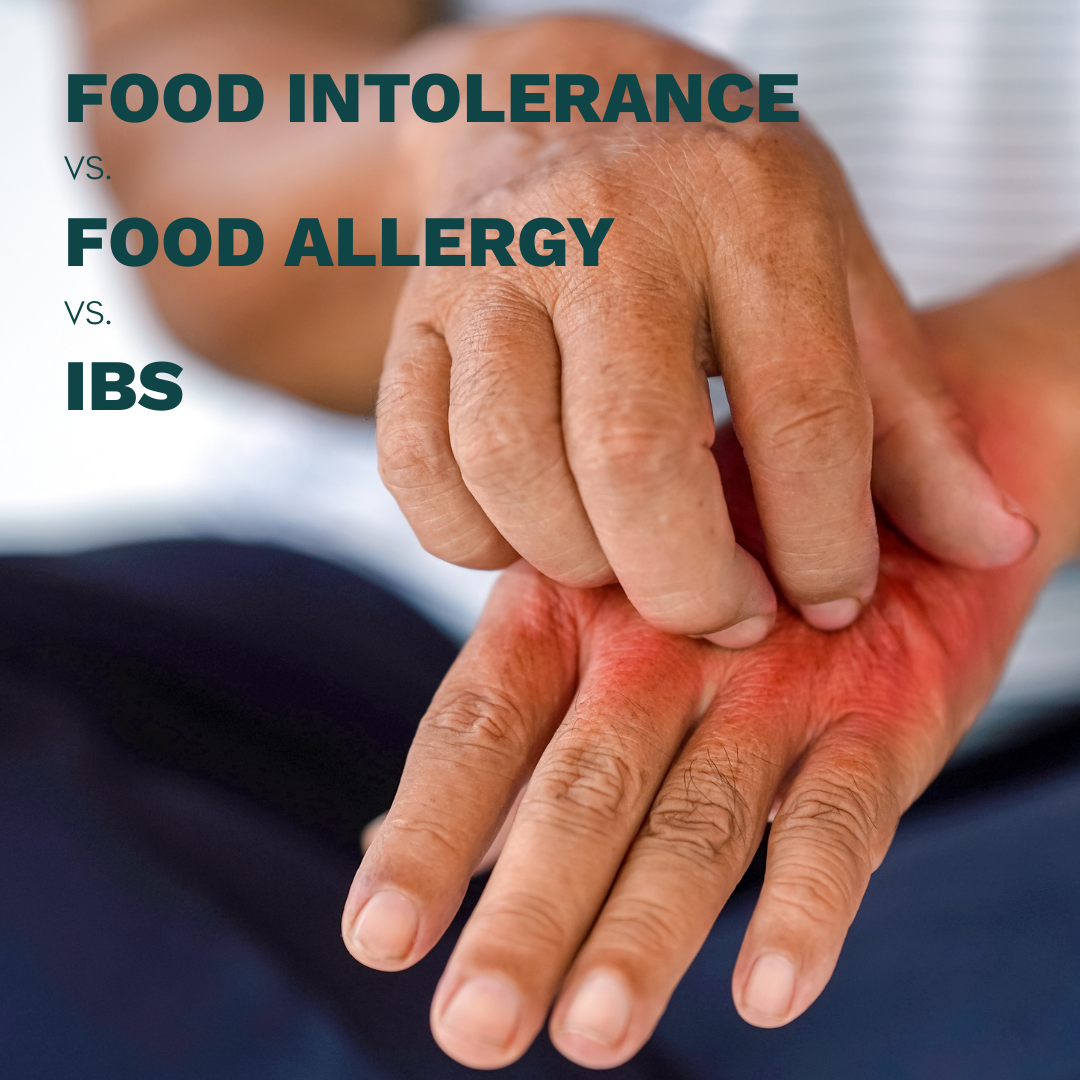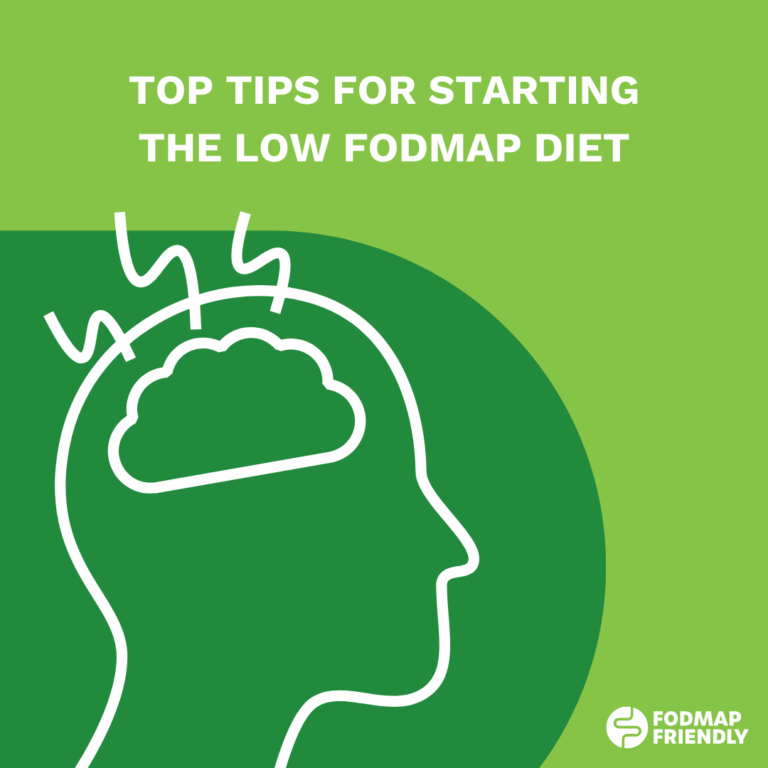Food intolerance, food allergy and IBS are often confused for one another. While they share some common symptoms, they are inherently different and should be treated accordingly. In this article, we explore how they are similar, different and whether they’re all connected!
What is a food intolerance?
Food intolerance or food hypersensitivity is a broad term used to describe a range of adverse reactions in response to eating certain foods. It is a chemical reaction that occurs when a person has difficulty digesting a particular food or food ingredient.
It can occur as a result of the absence of enzymes needed to digest a food, inborn sensitivity, chronic stress and, in some instances, IBS.
The symptoms of a food intolerance are often (but not always) limited to digestive problems. These include: indigestion, bloating, excessive gas or flatulence, nausea, vomiting, heartburn, diarrhoea, as well as recurrent mouth ulcers, headaches, fatigue and irritability.
What is IBS?
IBS stands for Irritable Bowel Syndrome. It is a common gastrointestinal disorder is a common, chronic disorder of gut–brain interaction characterised by recurrent abdominal pain associated with changes in bowel habits (such as diarrhoea, constipation, or both), without identifiable structural or biochemical abnormalities.
The symptoms vary in intensity and duration from person to person, but it doesn’t cause lasting damage nor contribute to the development of serious bowel conditions like cancer or colitis.
The exact cause of IBS is not fully understood, but it is considered a multifactorial disorder of gut–brain interaction. Research shows that symptoms can be influenced by a combination of alterations in the gut microbiome, immune system activity, and gut sensitivity. Various factors can trigger or worsen symptoms in susceptible individuals, including gastrointestinal infections, stress, hormonal changes, and even disruptions to routine or lifestyle.
What is a food allergy?
A true food allergy triggers an immune reaction that affects numerous organs in the body. Allergies are an overreaction of the body’s immune system, and they can cause a wide range of symptoms.
These include digestive problems similar to those of food intolerance along with itching, swelling, burning, runny nose, skin rash, asthma, and sometimes breathing difficulties.
If you’re allergic to a particular food, your body treats that offending food or food substance as if it were toxic, and the immune system will respond by producing antibodies to fight it!
How are they similar and different?
Symptoms:
Food allergy and intolerance are often confused for one another, as they share many of the adverse reactions. However, food intolerance does not involve the immune system and often does not affect other organs besides the digestive system.
In contrast, food allergy can affect various sites in the body as it is an immune response. These include your eyes, nose, mouth, throat, skin, lungs as well as the central nervous system. It is also often more intense and can sometimes be life-threatening (called anaphylaxis).
Response time:
If you have a food intolerance, the adverse reactions may develop instantly or it could take 12 to 24 hours. However, symptoms caused by food allergy tend to arise very soon after the offending food is consumed, typically within a few minutes to two hours.
Threshold:
Food intolerance reactions are dependent on the amount of food consumed. This means that the adverse reactions may not occur until a certain amount of food is consumed (threshold). With that said, the threshold and severity will vary from person to person.
For instance, you may be fine with ½ glass of milk but you may start to develop bloating and flatulence if you also add some cheese and yoghurt to the meal. This is a common scenario in someone with lactose intolerance.
Food allergy, on the other hand, is manifested regardless of the amount of food consumed. And often, the symptoms are more intense (i.e. any amount of milk is likely to trigger symptoms).
Relationship to IBS:
Food intolerance is related to IBS. It can develop as a result of IBS, but food allergy is often inherited or genetic in nature.
Testing:
There are specific tests that you could use for a food allergy and IBS, but to date there’s no effective test to diagnose a food intolerance.
In the case of food allergies, skin prick tests and blood tests for allergen-specific IgE may be helpful. IgE or immunoglobulin E is a type of antibodies that your body would produce in response to a food allergen. The presence of IgE antibodies would indicate an immune response, which means it’s an allergy.
Food intolerances, on the other hand, can be difficult to diagnose. This is because the severity and frequency of symptoms are dependent on various factors, such as how much of the food you’re consuming, how the food is prepared and your digestive health at the time of consuming that particular food.
To date, the most popular food intolerance test is the IgG blood tests. However, there is limited evidence to support its effectiveness.
Food intolerances and hormones – how they are linked?
It is reported that both food intolerances and food allergies are significantly more prevalent in females compared to males, especially after puberty. While the effect of sex hormones in food-related sensitivity is rarely investigated, experts believe that estrogen plays a major role.
Estrogen (the dominant female sex hormone) has a natural tendency to enhance immune responses as well as chemical reactions that take place with food intolerances.
In addition to estrogen, stress has also shown to induce food intolerances and to some extent food allergies and IBS. Studies show that stress hormone cortisol can disrupt the integrity of your stomach lining, which allows more of the offending food particle to get into the cells. This can consequently trigger sensitisation towards that particular and immune responses.
So how are these conditions treated?
The simplest way to treat a food allergy is to eliminate the offending food from your diet. For food intolerance, the offended food can be limited for a period of time and then start to reintroduce in small doses.
In terms of IBS, a low FODMAP diet has shown to be extremely effective. You can find the entire low FODMAP protocol along with references here.
With that said, it is essential to seek professional advice from a qualified dietitian specialising in gut health before eliminating or reintroducing foods to your diet.
Summary
Food intolerance, food allergy and IBS share some common features but are different conditions that require different diagnostic tests and treatments. If you suspect that you have any one of the conditions, it is important that you seek professional advice. From there, your Doctor or Dietitian can then direct you to appropriate tests and treatment strategies.






